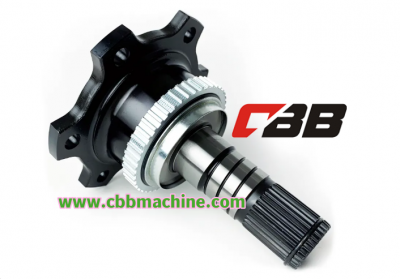Can Cbbmachine Support Your Differential Shaft Upgrade?
-
In winding and tension-sensitive applications, the Differential Shaft serves a specific purpose: to enable multiple cores to rotate independently while receiving uniform drive torque. This is essential in operations where varying roll diameters or material properties could otherwise cause uneven winding. Cbbmachine offers this solution with a design that supports smooth performance in systems requiring precision and adjustability.
The core concept behind this shaft design lies in friction control. Each core, mounted along the shaft, can respond to tension variations without manual intervention. This ensures consistent rewind tension across all rolls, even when materials behave unpredictably or differ slightly in thickness. It also helps minimize web deformation, edge curling, or misalignment—common issues in fast-moving production environments.
Instead of requiring operators to monitor and manually correct tension discrepancies, the shaft reacts mechanically to changes in torque demand. This reduces downtime, improves safety, and enhances material handling—especially for delicate substrates like films, foils, and labels. The overall benefit is not just technical—it contributes to smoother workflows and more predictable production outputs.
A well-designed differential shaft supports both high-speed operation and flexibility. From narrow slitters to wide-web rewinders, this technology adapts to a variety of setups. Whether you're handling large production runs or custom batches, its consistent performance helps reduce scrap and extend machine life.
Maintenance is another point of value. Because these shafts rely on controlled internal movement rather than rigid mechanical locking, wear and tear are often lower. With fewer components needing constant replacement, routine service becomes more straightforward and less frequent. This results in lower total cost of ownership over time.
Precision winding demands tight control at every stage. Using the right shaft ensures that control starts with the core—literally. Proper torque distribution helps align the entire downstream process, leading to fewer defects and reduced quality inspection overhead.
Before selecting a shaft, engineers typically review parameters like friction type, torque range, shaft diameter, and air or spring load systems. These criteria ensure compatibility with existing machines while allowing room for process evolution. When matched correctly, the shaft becomes a seamless part of the system—quiet, responsive, and unobtrusive.
Curious how your winding line could benefit from mechanical intelligence built into the core? Visit https://www.cbbmachine.com/news/industry-news/differential-air-shafts-key-components-applications-benefits-and-more.html and take a closer look—your next production upgrade might start with a single shaft.
